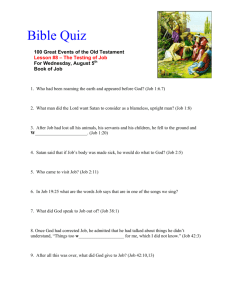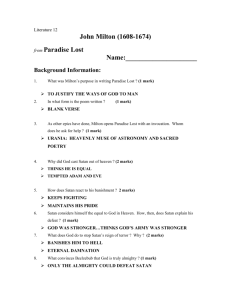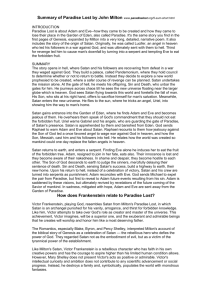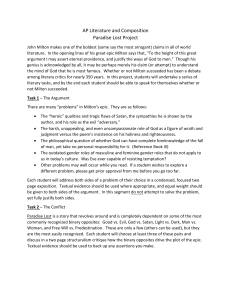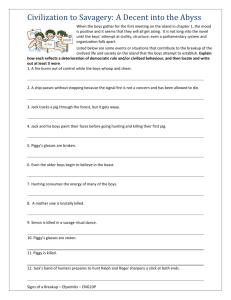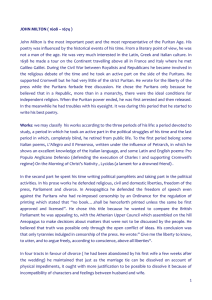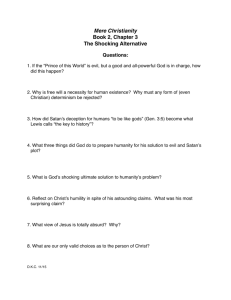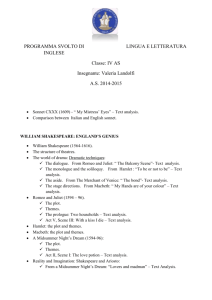PARADISE LOST
advertisement
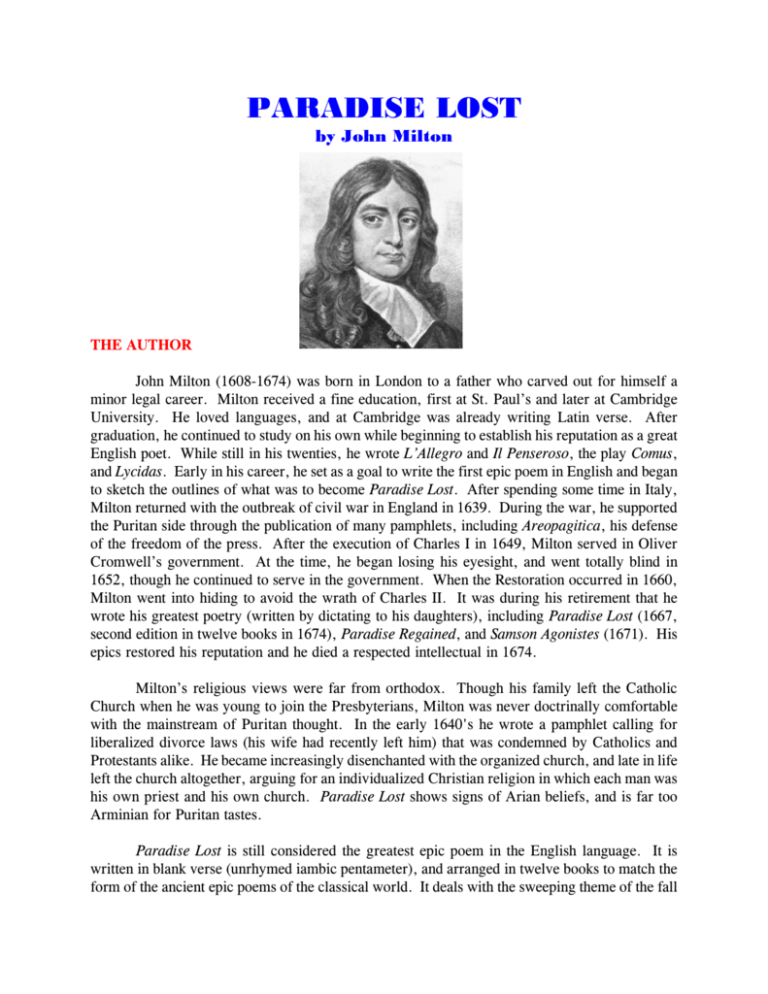
PARADISE LOST by John Milton THE AUTHOR John Milton (1608-1674) was born in London to a father who carved out for himself a minor legal career. Milton received a fine education, first at St. Paul’s and later at Cambridge University. He loved languages, and at Cambridge was already writing Latin verse. After graduation, he continued to study on his own while beginning to establish his reputation as a great English poet. While still in his twenties, he wrote L’Allegro and Il Penseroso, the play Comus, and Lycidas. Early in his career, he set as a goal to write the first epic poem in English and began to sketch the outlines of what was to become Paradise Lost. After spending some time in Italy, Milton returned with the outbreak of civil war in England in 1639. During the war, he supported the Puritan side through the publication of many pamphlets, including Areopagitica, his defense of the freedom of the press. After the execution of Charles I in 1649, Milton served in Oliver Cromwell’s government. At the time, he began losing his eyesight, and went totally blind in 1652, though he continued to serve in the government. When the Restoration occurred in 1660, Milton went into hiding to avoid the wrath of Charles II. It was during his retirement that he wrote his greatest poetry (written by dictating to his daughters), including Paradise Lost (1667, second edition in twelve books in 1674), Paradise Regained, and Samson Agonistes (1671). His epics restored his reputation and he died a respected intellectual in 1674. Milton’s religious views were far from orthodox. Though his family left the Catholic Church when he was young to join the Presbyterians, Milton was never doctrinally comfortable with the mainstream of Puritan thought. In the early 1640's he wrote a pamphlet calling for liberalized divorce laws (his wife had recently left him) that was condemned by Catholics and Protestants alike. He became increasingly disenchanted with the organized church, and late in life left the church altogether, arguing for an individualized Christian religion in which each man was his own priest and his own church. Paradise Lost shows signs of Arian beliefs, and is far too Arminian for Puritan tastes. Paradise Lost is still considered the greatest epic poem in the English language. It is written in blank verse (unrhymed iambic pentameter), and arranged in twelve books to match the form of the ancient epic poems of the classical world. It deals with the sweeping theme of the fall of man, beginning with the fall of Satan, followed by the Creation, innocence, and fall of man, and looking ahead to the redemption accomplished by Christ on the cross and the final judgment of the world by God. Instead of dealing with the exploits of a great warrior like Odysseus or Aeneas, however, the poem attempts to “justify the ways of God to men.” Many observers have noted, though, that, if the poem has a tragic hero, it is Satan, whom many find to be the most attractive character in the story. MAJOR CHARACTERS • Satan - An angel named Lucifer who rebels against God and takes one-third of the angels with him. He and his followers are cast out of Heaven into Hell, where they build a great palace and scheme about revenge. Satan escapes from Hell and travels to earth, where he brings about the fall of Adam and Eve. • Adam - The first man, who falls into sin because of his love for his wife. • Eve - She succumbs to Satan’s temptations and eats the fruit of the Tree of the Knowledge of Good and Evil, then convinces her husband to follow suit. • God the Father - Creator of the world and sovereign ruler of the universe. • The Son of God - For Milton, a created being who becomes the Son of God by divine decree. He defeats Satan’s rebellion, creates the earth, passes judgment on Adam and Eve, and offers himself as a sacrifice for sinners. • Beelzebub - Satan’s highest-ranking lieutenant, he is the one who suggests getting revenge against God by attacking the newly-created earth. • Belial - Argues against attacking earth because he would prefer to do nothing, hoping to gain God’s forgiveness eventually. • Mammon - Urges the demons to mine the wealth of Hell and build a rival kingdom. • Moloch - Argues in favor of a frontal assault against the forces of Heaven. • Sin and Death - Satan’s daughter and his son by his daughter, they guard the gates of Hell, and later travel to the newly-corrupted earth to establish their reign there. • Gabriel - One of the greatest warrior angels, his task is to guard the gates of Paradise. • Raphael - An archangel who is sent to warn Adam of Satan’s plot to tempt him and bring him down. He is the one who described Satan’s rebellion to Adam (and the reader). • Uriel - An angel who guards the passageway to the planet earth; Satan tricks him by disguising himself as a cherub and gains passage. When Uriel realizes what has happened, he alerts others to Satan’s trickery. • Abdiel - The only angel who is invited to join Satan’s rebellion who refuses to do so. • Michael - The head of the heavenly host, he leads the good angels into battle against Satan. He later comes to earth to eject Adam and Eve from the Garden of Eden, but first gives Adam a vision of the future history of the human race. NOTABLE QUOTATIONS “I may assert Eternal Providence, And justify the ways of God to men.” (I, 25-26) “Fallen Cherub, to be weak is miserable, Doing or suffering: but of this be sure To do aught good never will be our task, But ever to do ill our sole delight, As being the contrary to his high will Whom we resist. If then his providence Out of our evil seek to bring forth good, Our labor must be to pervert that end, And out of good still to find means of evil; Which ofttimes may succeed so as perhaps Shall grieve him, if I fail not, and disturb His inmost counsels from their destined aim.” (Satan - I, 157-168) “So stretched out huge in length the Arch-fiend lay, Chained on the burning lake; nor ever thence Had risen, or heaved his head, but that the will And high permission of all-ruling Heaven Left him at large to his own dark designs, That with reiterated crimes he might Heap on himself damnation, while he sought Evil to others, and enraged might see How all his malice served but to bring forth Infinite goodness, grace, and mercy, shewn On Man by him seduced, but on himself Treble confusion, wrath, and vengeance poured.” (I, 209-220) “The mind is its own place, and in itself Can make a Heaven of Hell, a Hell of Heaven.” (Satan - I, 254-255) “Better to reign in Hell than serve in Heaven.” (Satan - I, 263) “Let none admire That riches grow in Hell; that soil may best Deserve the precious bane.” (I, 690-692) “Where there is, then, no good For which to strive, no strife can grow up there From faction: for none sure will claim in Hell Precedence; none, whose portion is so small Of present pain that with ambitious mind Will covet more!” (Satan - II, 30-35) “O shame to men! Devil with devil damned Firm concord holds; men only disagree Of creatures rational, though under hope Of heavenly grace, and, God proclaiming peace, Yet live in hatred, enmity, and strife Among themselves, and levy cruel wars Wasting the earth, each other to destroy: As if (which might induce us to accord) Man had not hellish foes enow besides, That day and night for his destruction wait!” (II, 496-505) “In discourse more sweet (For eloquence the Soul, Song charms the Sense) Others apart sat on a hill retired, In thoughts more elevate, and reasoned high Of Providence, Foreknowledge, Will, and Fate Fixed fate, free will, foreknowledge absolute, And found no end, in wandering mazes lost. Of good and evil much they argued then, Off happiness and final misery, Passion and apathy, and glory and shame: Vain wisdom all, and false philosophy!” (II, 555-565) “So little knows Any, but God alone, to value right The good before him, but perverts best things To worst abuse, or to their meanest use.” (IV, 201-204) “Two of far nobler shape, erect and tall, God-like erect, with native honour clad In naked majesty, seemed lords of all, And worthy seemed; for in their looks divine The image of their glorious Maker shone, Truth, wisdom, sanctitude severe and pure Severe, but in true filial freedom placed, Whence true authority in men: though both Not equal, as their sex not equal seemed; For contemplation he and valor formed, For softness she and sweet attractive grace; He for God only, she for God in him.” (IV, 288-299) “Honour and empire with revenge enlarged By conquering this new World - compels me now To do what else, though damned, I should abhor.” (Satan - IV, 390-392) “My author and disposer, what thou bidd’st Unargued I obey. So God ordains: God is thy law, thou mine: to know no more Is woman’s happiest knowledge, and her praise.” (Eve - IV, 635-638) “That thou art happy, owe to God; That thou continuest such, owe to thyself, That is, to thy obedience; therein stand.” (Raphael - V, 520-522) “But knowledge is as food, and needs no less Her temperance over appetite, to know In measure what the mind may well contain; Oppresses else with surfeit, and soon turns Wisdom to folly, as nourishment to wind.” (Raphael - VII, 126-130) “There wanted yet the master-work, the end Of all yet done - a creature who, not prone And brute as other creatures, but endued With sanctity of reason, might erect His stature, and upright with front serene Govern the rest, self-knowing, and from thence Magnanimous to correspond with Heaven, But grateful to acknowledge whence his good Descends; thither with heart, and voice, and eyes Directed in devotion, to adore And worship God Supreme, who made him chief Of all his works.” (Raphael - VII, 505-516) “To ask or search I blame thee not; for Heaven Is as the Book of God before thee set, Wherein to read his wondrous works, and learn His seasons, hours, or days, or months, or years.” (Raphael - VIII, 66-69) “Whether the Sun, predominant in heaven, Rise on the Earth, or Earth rise on the Sun; He from the east his flaming road begin, Or she from west her silent course advance With inoffensive pace that spinning sleeps On her soft axle, while she paces even, And bears thee soft with the smooth air along Solicit not thy thoughts with matters hid; Leave them to God above; him serve and fear.” (Raphael - VIII, 160-168) “Heaven is for thee too high To know what passes there. Be lowly wise; Think only what concerns thee and thy being; Dream not of other worlds, what creatures there Live, in what state, condition, or degree Contented that thus far hath been revealed Not of Earth only, but of highest Heaven.” (Raphael - VIII, 172-178) “For nothing lovelier can be found In woman than to study household good, And good works in her husband to promote.” (Adam - IX, 232-234) “The wife, where danger or dishonor lurks, Safest and seemliest by her husband stays, Who guards her, or with her the worst endures.” (Adam - IX, 267-269) “However, I with thee have fixed my lot, Certain to undergo like doom. If death Consort with thee, death is to me as life; So forcible within my heart I feel The bond of Nature draw me to my own My own in thee; for what thou art is mine. Our state cannot be severed; we are one, One flesh; to lose thee were to lose myself.” (Adam - IX, 952-959) “He scrupled not to eat, Against his better knowledge, not deceived, But fondly overcome with female charm.” (IX, 997-999) “Thus it shall befall Him who, to worth in women overtrusting, Lets her will rule: restraint she will not brook; And, left to herself, if evil thence ensue, She first his weak indulgence will accuse.” (IX, 1182-1186) “Did I request thee, Maker, from my clay To mould me Man? Did I solicit thee From darkness to promote me, or here place In this delicious garden?” (Adam - X, 743-746) “Oh, why did God, Creator wise, that peopled highest Heaven With Spirits masculine, create at last This novelty on Earth, this fair defect Of Nature, and not fill the World at once With men as Angels, without feminine; Or find some other way to generate Mankind? This mischief had not then befallen, And more that shall befall - innumerable Disturbances on Earth through female snares, And straight conjunction with this sex. For either He never shall find out fit mate, but such As some misfortune brings him, or mistake; Or whom he wishes most shall seldom gain, Through her perverseness, but shall see her gained By a far worse, or, if she love, withheld By parents; or his happiest choice too late Shall meet, already linked and wedlock-bound To a fell adversary, his hate or shame: Which infinite calamity shall cause To human life, and household peace confound.” (Adam - X, 888-908) “O Sons, like one of us Man is become To know both good and evil, since his taste Of that defended fruit; but let him boast His knowledge of good lost and evil got, Happier had it sufficed him to have known Good by itself and evil not at all.” (God - XI, 84-89) “O execrable son, so to aspire Above his brethren, to himself assuming Authority usurped, from God not given! He gave us only over beast, fish, fowl, Dominion absolute; that right we hold By his donation: but man over men He made not lord - such title to himself Reserving, human left from human free.” (Adam - XII, 64-71) “Therefore, since he permits Within himself unworthy powers to reign Over free reason, God, in judgment just, Subjects him from without to violent lords, Who oft as undeservedly enthrall His outward freedom. Tyranny must be, Though to the tyrant thereby no excuse.” (Michael - XII, 90-96) “They, hand in hand, with wandering steps and slow, Through Eden took their solitary way.” (XII, 648-649) NOTES Book I - After an opening invocation of the Heavenly Muse (the Holy Spirit) and a brief overview of the story about to be narrated, Milton takes us immediately to the Lake of Fire, where Satan and his angels have been cast following their unsuccessful rebellion against God. They are chained to the burning lake, but God, by His providence, allows them to rise from the lake and move freely about. Satan and his lieutenant Beelzebub discuss the failed rebellion and determine to do all in their power to frustrate God’s intentions, while Satan boldly insists that the mind can make of any situation whatever it will, and that it is better to reign in Hell than to serve in Heaven. Satan then rises from the lake and flies to the burning soil on its shore, calling with him the chief of his demons (named and described by Milton, these are the pagan gods worshiped by the Canaanites and the Titans of Greek mythology), who then stand before their hosts in the shape of a mighty army. They declare their eternal enmity against God, then get to work building the magnificent and horrible palace Pandemonium (a word coined by Milton, referring to all the demonic hosts). While the demons gather in the newly-built palace, Satan and his chief lieutenants hold a council of war. Book II - Satan, in the palace of Pandemonium, calls a council of war to determine what response should be made to secure revenge against their divine Conqueror. Moloch advocates open war, arguing that God can do nothing to them worse than what He has done already. In fact, He might even destroy them, which would be better than their present state. Belial advocates doing nothing, arguing that things indeed could be worse, and that God might even see fit to pardon them if they behaved themselves. Mammon counters by saying that, should God pardon them, worshiping their sworn enemy would be torture in itself; instead, they should accustom themselves to Hell, the pain of which will decrease as they do so, and concentrate on building a kingdom to rival that of Heaven. Beelzebub is the last demon to speak, and urges them to oppose God by corrupting a new creation, rumored in the courts of Heaven prior to their rebellion, and thus gain their revenge on the Almighty. Satan supports Beelzebub’s suggestion, and offers to make the dangerous journey to locate the new world in person and alone. While the other demons amuse themselves in a variety of ways, Satan undertakes the journey, traveling to the boundaries of Hell, where he manages to get past Sin and Death, the guardians of the gate, by convincing them that the corruption of this new world will give them food aplenty. He is then guided by Chaos to within sight of the new world that is now his target. Book III - The scene now shifts to Heaven. God, on His throne, sees Satan flying toward the newly-created earth. He predicts that Satan will seek to corrupt mankind and will succeed, and notes that Satan and man bear the responsibility for the entrance of sin into the world because God created each with a free will. God then declares that He intends to be merciful to man, since he sinned through trickery rather than through malice, as Satan had. The problem, of course, is that the penalty for man’s sin is death, and God’s justice demands satisfaction. God asks for volunteers; all the heavenly host remains silent, but then the Son offers Himself as a sacrifice for the sin of man. God accepts the offer, then speaks of the Incarnation, resurrection, and exaltation of the Son. The angels then sing a hymn of praise. Meanwhile, Satan arrives at the gate of Heaven, at the outermost orb of the spheres surrounding the earth. There he discovers a staircase leading down to earth. After disguising himself as an angel of lesser degree, he tricks Uriel, the ruler of that sphere, to show him the way to earth and tell him where to find God’s newest creation, man. Satan then flies down to earth and lands on Mount Niphates in Armenia. [NOTE: Milton’s view of Christ is Arian (309-311); he denies the omniscience of God, arguing that the fall occurred apart from divine foreknowledge (111-119); and his view of salvation is decidedly Arminian (168-202). In other words, he did not share the theology of the Puritans among whom he served under Oliver Cromwell.] Book IV - Satan now flies to Paradise, where he easily surmounts the boundary of the Garden of Eden. There he perches in the form of a cormorant at the top of the Tree of Life, where he is able to see the entire Garden. He observes its beauties, then goes in search of its human inhabitants, disguising himself as various animals in the process. When he encounters Adam and Eve for the first time, Milton gives us a description of them in all their unfallen glory. As Satan listens to Adam and Eve’s conversation, he learns that the Tree of the Knowledge of Good and Evil was forbidden to them, and determines to use this to bring about their downfall and thus revenge himself upon God. After he leaves them to plot his means of attack, Adam and Eve prepare for bed, discussing the blessings of God they enjoy and giving Him worship. Meanwhile, Uriel descends to warn Gabriel, the guardian of the Garden, that an evil spirit had slipped in unawares. Gabriel calls out his lieutenants and disperses them around the Garden to locate the intruder. This they do, finding him whispering rebellious thoughts into Eve’s ear as she sleeps. They bring him to Gabriel, who threatens to send him back to Hell in chains should he interfere further with God’s newest creation. Satan, breathing threats and defiance, angrily flies out of the Garden. Book V - When Adam and Eve awake the next morning, Eve recounts her troubling dream, in which an evil tempter thrust before her the fruit of the Tree of Knowledge and lured her into disobedience. Adam comforts her by telling her that her hatred of her dream will only strengthen her resolve to remain obedient to God. They then sing a hymn of worship before beginning the labors of the day. God, to make sure than man has no possible excuse for his disobedience, send the seraph Raphael to warn Adam and Eve, telling them of the presence of Satan in the Garden and letting them know what he seeks to accomplish. In the process of doing so, he describes the fall of Satan from Heaven. On the day in Heaven on which the Son was begotten and proclaimed to be the ruler of all, Lucifer, in a fit of jealousy, called together all the legions loyal to him, instructing them to meet him in the North, supposedly in order to prepare a fit welcome for the newly-proclaimed King. In reality, he is plotting rebellion. Among those gathered, numbering a full third of the heavenly host, only the seraph Abdiel opposes Satan’s scheme, rebuking him for the traitor he is. Book VI - Raphael continues his tale, describing Satan’s rebellion and the ensuing war in Heaven. Abdiel returns to find the heavenly host already girding for battle. God has appointed the archangel Michael and Gabriel to lead the attack, and they do so with great success. Michael himself encounters Satan in the field and deals him a blow that severs his sword and pierces his body. The rebellious angels are shocked to feel pain for the first time, but soon discover that their bodies are such that even the worst of wounds quickly closes over and heals. Satan and his forces retreat from the field to prepare for their next assault. During the night, Satan proposes a new strategy - essentially, he invents the cannon, which, when unveiled, briefly catches the angelic army by surprise and routs them. They retreat and regroup, however, tearing up the mountains by the roots and casting them upon their unsuspecting foes. After two days of battle, God intervenes, determined that the glory should belong to His Son. As the sun rises on the third day, Christ enters the field in His blazing chariot (looking very much like Ezekiel’s vision). He orders the angels to stand aside and single-handedly drives the forces of Satan before Him. When they reach the walls of Heaven, a breach is opened, through which the forces of evil leap, falling for nine days until they land in the pit of Hell prepared for them by a wrathful God. Raphael concludes his story by warning Adam that a similar fate will be his should he disobey his Maker. Book VII - Adam now asks Raphael about the creation of the world. Raphael satisfies his curiosity by telling him that, after the defeat of Satan, God decided to create a World to show Satan that he could easily be replaced in the divine order of things. He delegates the task to His Son, accompanied by a host of angels. The Son then creates the heavens and the earth in their proper (Ptolemaic) spheres, and fills the earth, with the narrative closely following the description given in Genesis 1. Lastly, God creates man, male and female, as the pinnacle of His creative works. The Son and the angels then return to Heaven, where all sing praise to God for His marvelous works, thus establishing the Sabbath day. Book VIII - The conversation continues as Adam asks Raphael about the structure and movements of the heavens. At this point, Eve decides to go tend to the Garden (obviously not a science buff, but her excuse is that she would rather hear about these things from Adam, since he will explain things slowly and carefully and caress her in the process). Raphael refuses to tell Adam whether the Ptolemaic or Copernican system is correct, insisting that it really doesn’t matter and that Adam should concentrate on things that directly affect his life. Adam concedes the point, but, wanting to prolong his conversation with the seraph, tells him the story of his own earliest memories - his first view of the world in which God had placed him, his conversation with God in the Garden, and the naming of the animals. He also recounts his sense of incompleteness at finding no animal worthy to be his companion. God then puts him to sleep and makes from his rib the most beautiful creature he had ever seen - Eve, who then becomes his wife. Raphael at this point warns Adam not to make an idol of Eve, especially her lovely shape and the physical pleasure she gives him. Adam then asks if angels experience love in their incorporeal state, and Raphael assures him that they do, though it is of a very different character than man’s physical joys. At this point, Raphael departs with a final warning to Adam to avoid disobedience. Book IX - Satan, after circling the earth for seven days, avoiding the notice of the angels, enters Paradise covertly in the form of a mist. In the night, he creeps upon a sleeping serpent and enters him through the mouth. When morning breaks, Adam and Eve arise for their day’s labors. Eve suggests that they split up because there is so much work to be done and working together can prove a distraction. Adam objects, fearing that she should be easy prey for the evil one should she go off by herself, but she responds that his attitude shows a lack of confidence in her. He finally relents despite his misgivings, and they agree to meet at their bower at noon. As Eve begins her work, the serpent approaches her and begins to praise her beauty. Startled, she asks the snake how he gained the power of speech. The serpent replies that he gained it by eating the fruit of a certain tree in the Garden. Eve asks him which tree it was, and he offers to lead her there. When she finds that he has brought her to the Tree of the Knowledge of Good and Evil, she tells him that it is forbidden. He then argues that it has done him no harm; in fact, he has been elevated in the chain of being from beast to human, so that she should anticipate that, if she ate, she would be raised to the level of the gods. She demurs, but he continues to bring arguments against whatever she has to say. Finally, she eats, finds that the fruit tastes wonderful, and that it has done her no harm. She then determines to make Adam share her fate. She takes some of the fruit with her to the bower and tells Adam what she has done. He, feeling both great sorrow and great love for her, decides to eat the fruit in order to share whatever consequences it may bring. Initially, he shares her joy at the new sensations, and they indulge in a lustful romp. When they awake, however, they are filled with shame, try to cover their nakedness, and begin to blame one another - he claims that she should never have gone off by herself in the first place, and she responds that, if he had been the leader he was supposed to be, he never would have let her go despite her arguments. Book X - Once man has sinned, the angels who are assigned to guard Paradise fly up to Heaven, where God absolves them of any blame for what occurred. He then sends Christ to pronounce judgment on Adam and Eve. Christ pronounces the curse, then in pity clothes the transgressors and returns to Heaven. Meanwhile, Sin and Death, buoyed by Satan’s success, build a bridge over Chaos in order to follow Satan to the newly-corrupted earth, over which they are now to hold sway. Satan returns to Pandemonium, and is received with adulation, which turns to hissing as the demons are transmuted into the form of the serpent used by Satan to tempt Eve in the Garden. The demons then see a copy of the Tree of the Knowledge of Good and Evil before them, but when they eat its fruit, they taste only dust and ashes. God then foretells His Son’s victory over Sin and Death, and orders the angels to make alterations in the heavens (including tilting the earth’s axis or the sun’s orbit - Milton often gives both Ptolemaic and Copernican options). Adam, meanwhile, becomes more cognizant of the consequences of his actions, and bitterly bewails his folly. Eve tries to comfort him, and at first he refuses to be comforted, but finally receives her solicitations. Fearing the consequences of passing the curse onto their offspring, they consider either suicide or barrenness, but Adam reminds Eve of the promise that it is her seed that will finally crush their great enemy, the Serpent. They then sincerely repent of their evil deed and beg God for forgiveness. Book XI - God accepts the repentance of Adam and Eve, but decrees that they must leave Paradise. He sends Michael, accompanied by cherubim, to do the deed. As Michael approaches, Adam sees signs of corruption affecting the created universe. Michael tells them they must leave the Garden; Eve responds with tears, Adam with prayers, but they finally submit to God’s decree. Michael then leads Adam to the top of a high hill, where he shows him the history of the human race up through the Flood, including the murder of Abel by Cain, the sinful pursuit of autonomy by the descendants of Cain, the increase of wickedness prior to the Flood, and God’s mercy on Noah and his family through the Deluge. Book XII - Michael continues his tale, from the sin of Ham through the rise of Nimrod, the building of the Tower of Babel, the confusion of tongues, the call of Abraham, the rise and deliverance from Egypt of the nation of Israel, the monarchy, the captivity, the coming of Christ as the promised Seed of the Woman, His death and resurrection, the rise and corruption of the Church, and Christ’s second coming and final judgment. Adam, greatly encouraged by what God will accomplish through His mercy, goes down the hill with Michael, where they find Eve, who had been sleeping, given comforting dreams by God, and prepare to depart. Michael gently leads them out of Paradise, and the cherubim guard the way to the Tree of Life with a flaming sword. ESSAY QUESTIONS Discuss the following in a five-paragraph essay: 1. Discuss the picture of Hell presented in John Milton’s Paradise Lost. Does Milton’s view of Hell correspond to that given in Scripture? Pay special attention to the idea of Satan as the ruler of Hell. 2. Discuss the picture of Satan presented in John Milton’s Paradise Lost. Why is Satan the favorite character in the poem for many readers? Does Milton present Satan as a tragic hero? Why or why not? 3. Discuss the picture of Satan presented in John Milton’s Paradise Lost. Does Milton picture Satan as being completely evil? While this may make him more interesting as a dramatic character, is it true to Scripture? Does the Bible require that we imagine Satan as having no positive qualities whatsoever - as the quintessence of villainy? 4. In Book II, lines 496-505 of John Milton’s Paradise Lost, the poet argues that there can be no conflict in Hell because there is nothing valuable about which demons could possibly fight. Discuss this concept. Is there such a thing as “honor among thieves”? Contrast Milton’s view with that presented by C.S. Lewis in The Screwtape Letters. 5. In Book II, lines 555-565 of John Milton’s Paradise Lost, the poet pictures demons in Hell who are waiting for Satan’s return from earth. While they wait, they while away the time discussing issues like divine foreknowledge and free will. Milton pictures such discussion as “Vain wisdom all, and false philosophy!” Do you agree? Are such discussions truly fruitless, better suited to the denizens of Hell than to the children of God on earth? Why do you think so? 6. To what extent are Christ and Satan pictured as foils in Books II-III of John Milton’s Paradise Lost? What do the parallel structures of the two books communicate about the two great antagonists and the battle in which they are engaged? 7. Analyze the theology expressed in Book III of John Milton’s Paradise Lost. Choose one doctrinal area from the chapter - either the doctrine of God, the doctrine of salvation, or the question of free will - and evaluate the theological ideas expressed by Milton in the poem. Do they correspond with the teachings of Scripture? Why or why not? Be sure to use specific quotations from the poem and specific verses of Scripture to argue your point. 8. In John Milton’s Paradise Lost, the poet gives us our first glimpse of Adam and Eve when Satan first sets eyes on them in Book IV, lines 288-299. Discuss the descriptions given of the first couple in these lines. Are they true to Scripture? Does Milton’s description of their gender characteristics conform to what the Bible teaches? Why or why not? You may incorporate material from other parts of the poem in your discussion. 9. Compare and contrast the pictures of the temptation of Eve in the Garden of Eden presented in John Milton’s Paradise Lost and C.S. Lewis’ Perelandra. Which do you believe gives greater insight into the ways in which Satan seeks to plunge the human race into sin? Why? Support your answer with evidence from both books. 10. Compare and contrast the treatments of sin and temptation in C.S. Lewis’ Perelandra and John Milton’s Paradise Lost. What themes do the two works have in common? In what ways do the differences in genre influence the treatment of those themes? 11. Both C.S. Lewis’ Perelandra and John Milton’s Paradise Lost deal with the temptation of unfallen man by Satan in an earthly paradise. Do the two authors view the nature of temptation in the same way? How are their ideas different? 12. Compare and contrast the portrayals of Satan in C.S. Lewis’ Perelandra and John Milton’s Paradise Lost. Which do you consider to be the more powerful? Which gives more incisive insight into the ways in which Satan tempts people today? Why do you think so? Support your answer with details from both works of literature. 13. One great problem encountered by those who would fictionalize the Fall is to explain how the ideas that lead to sin enter the minds of sinless beings. One might argue, for instance, that Eve had already fallen before she ate the fruit of the tree, since she had already displayed qualities of pride, lust, and autonomy. How is this problem of “a Fall before the Fall” handled in C.S. Lewis’ Perelandra and John Milton’s Paradise Lost? Keep in mind that, shortly before writing his novel, Lewis had published A Preface to Paradise Lost, so that similarities between the two are in no way accidental. Which one handles the problem in a more convincing manner, given that Scripture tells us virtually nothing of the psychology of Eve before and during the conversation with the Serpent? 14. Compare and contrast the descriptions of God’s work of creation found in John Milton’s Paradise Lost and C.S. Lewis’ The Magician’s Nephew. Which description, in your opinion, brings out more effectively the narrative of Genesis 1? Why do you think so? Use details from both books to support your argument. 15. Discuss the description of man as he was created different from the animals in Book VII, lines 505-516 of John Milton’s Paradise Lost. What, according to Milton, is the essence of what distinguishes man from the other creatures? To what extent does this correspond to what the Bible teaches about man being made in the image of God? Pay attention to the details in your discussion, and use Scripture to support your arguments. 16. In Book VIII, lines 160-178 of John Milton’s Paradise Lost, the angel Raphael warns Adam against seeking knowledge that is too high for him. Why is such a search dangerous? Was Milton implying that science itself is an illegitimate and prideful pursuit? Why or why not? Support your arguments with specifics from the poem. 17. In John Milton’s Paradise Lost, the poet characteristically presents both Ptolemaic and Copernican views of the universe when discussing the configuration of the Heavens. He thus implies that it is not essential that men settle the issue, since it does not impinge on the matter of godly living, which should be man’s chief pursuit. Do you agree that Christians shouldn’t concern themselves with scientific disputes about the nature of the universe? Is such knowledge worthwhile, or does it distract people from what should be their true focus in life? 18. Discuss the portrayals of Adam and Eve before the Fall found in John Milton’s Paradise Lost. What do you think of Milton’s pictures of ideal manhood and womanhood? Are these pictures caricatures, or faithful portrayals of what God intended man and woman to be? Why do you think so? Be sure to support your arguments with specifics from the poem and from Scripture. 19. In John Milton’s Paradise Lost, what is Adam’s chief flaw? Why do you choose that characteristic rather than others? Support your argument with specifics from the poem. 20. In John Milton’s Paradise Lost, why does Satan rebel against God? How does he rationalize his rebellion? Discuss how Satan’s initial rebellion against God encapsulates the very nature of sin in the world. 21. Compare the pictures of Hell found in John Milton’s Paradise Lost and Dante’s Inferno. Why is it difficult in many ways to compare the two? To what extent do the pictures of Hell given in the two poems reflect the respective theologies of the poets? 22. Compare and contrast the views of the classical world and classical literature found in John Milton’s Paradise Lost and Dante’s Inferno. Discuss both poets’ views of the relationship between the classical and Christian worlds, their own relationships to the classical poets, and their views of the value of classical civilization and literature. 23. In John Milton’s Paradise Lost, to what extent is sin pictured as an inversion of the divinely-ordained hierarchy of the universe? Be sure to apply your arguments to both the fall of Satan and the fall of man. 24. In John Milton’s Paradise Lost, does the poet picture the fall of man as a good thing? What benefits come through the fall that otherwise would not have existed? Do these benefits make sin worthwhile? Why or why not? 25. In John Milton’s Paradise Lost, the poet begins his narrative in medias res (“in the middle of things”), then gives background information on the fall of Satan and the war in Heaven in narratives told by characters in the story. This technique is very common in narrative fiction. What are the advantages to beginning a story in medias res? Use specific examples from the poem to show how Milton’s technique enhances the interest and involvement of his readers. 26. In Book I of John Milton’s Paradise Lost, Satan says, “The mind is its own place, and in itself / Can make a Heaven of Hell, a Hell of Heaven.” To what extent does this statement prove true for Satan himself in the story? Support your arguments with specifics from the poem. 27. In Book I of John Milton’s Paradise Lost, Satan says, “The mind is its own place, and in itself / Can make a Heaven of Hell, a Hell of Heaven.” In what ways is this statement true, and in what ways is it false? Support your answer from the poem and from human experience. 28. Discuss the relationship between reason and revelation in John Milton’s Paradise Lost. According to the poet, under what circumstances is man to rely on his God-given reason, and in what circumstances is he to set his reason aside and obey what God has said? 29. In John Milton’s Paradise Lost, the poet’s stated purpose is theodicy - “to justify the ways of God to men.” In your opinion, does he succeed? To what extent does he answer the great question of the problem of evil? Support your answer with specifics from the poem. 30. Discuss Satan’s justification for his rebellion against God in John Milton’s Paradise Lost. If those same arguments were applied to the subject of earthly revolution (say, for instance, the Puritan rebellion against Charles I), would they be biblically acceptable? Why or why not? What is Milton implying by putting these arguments in the mouth of Satan? Please keep in mind that Milton was one of the leading apologists for the execution of the king. 31. In John Milton’s account of the fall of man in Paradise Lost, he pictures the sins of Adam and Eve as different forms of idolatry. What is the chief idol of each of the characters? What does Milton’s portrayal say about the proper relationships between man and woman and man and God? Is Milton’s treatment of these issues faithful to Scripture? Why or why not? 32. Compare and contrast the relationship of Adam and Eve to one another before and after the fall in John Milton’s Paradise Lost. What has changed and what remains the same? What does this tell us about the nature and consequences of sin? Is Milton’s treatment of this issue faithful to Scripture? Why or why not? 33. Compare and contrast the characterizations of Mephistophilis in Christopher Marlowe’s Doctor Faustus and Satan in John Milton’s Paradise Lost. Which character do you consider the more impressive literary creation? Which is more persuasive in his arguments? Why do you think so? 34. In lines 9-28 of The Passing of Arthur in Alfred, Lord Tennyson’s Idylls of the King, Arthur struggles with the collapse of his kingdom, and more broadly with the problem of evil. Is Tennyson’s work, like that of Milton in Paradise Lost, intended to “justify the ways of God to man”? Why or why not? Are their approaches to the question the same? If not, how are they different? 35. Compare and contrast the view of demons found in C.S. Lewis’ The Screwtape Letters with that found in John Milton’s Paradise Lost. Which is more biblical? Why do you think so? Support your conclusion with details from both books. 36. Compare and contrast the views of Satan found in John Bunyan’s Pilgrim’s Progress and John Milton’s Paradise Lost. Which do you consider more biblical, and why? Use details from both works and specific references from Scripture in answering the question.
